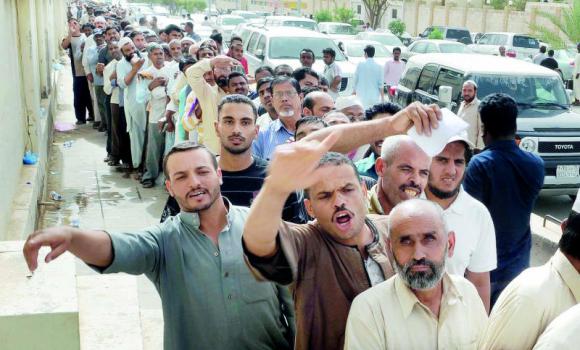
Jeddah, May 16: Saudi Passport authorities will begin Saturday the exit process of all expatriates who want to leave the country, announced Indian Consul General Faiz Ahmed Kidwai.
Addressing a community meeting at the Indian consulate last night, he said travel documents issued by the consulate will be accepted by Passport authorities for stamping of exit process for all individuals who do not have original passports and want to leave the country.
He said the applicant must visit the deportation center with travel document or passport. The individual’s biometric data will be recorded and exit granted.
Although Kidwai was speaking specifically about Indian citizens, the exit process applies to all expats regardless of nationality.
Kidwai emphasized that biometric data will not be used to bar any worker re-entry into the Kingdom as announced by the Saudi authorities. He also added that presenting an air ticket is not necessary.
He said the Ministry of Labor is not asking for any educational degrees for change of professions except in case of professional jobs such as engineers and doctors.
He also said that labor offices throughout the Kingdom have launched special kafala (sponsorship) transfer area for expediting the process of change of sponsorship with the condition that transfer must take place in the same area in which the new sponsor resides. The service is also made available online.
Kidwai said all entities can correct their professions regardless of Nitaqat system without fees. This can be done through Labor Ministry’s Web portal for which a password is provided by the ministry. Domestic workers can also change their profession, but only through the Passport Office.
He said that the consulate website has links to Saudi Labor Ministry that allows expats to check the status of Nitaqat ratings of the companies for prospective job offerings from employers.
The consul general said the Indian Consulate will issue emergency certificates beginning Tuesday. It will deliver 500 emergency certificates on June 30, according to serial number of registration base.
He also added that emergency certificates will be delivered in Abha on May 23 and on the same day in Bisha. Certificates will also be delivered to Makkah on June 1, and in Taif and Al Baha on June 13, Najran on June 27, Yanbu on June 6 and Tabuk on June 20.
He said the mission received 15,270 applications for seeking travel documents through yesterday.
Kidwai said the consulate has uploaded all passports, which were handed over by Saudi authorities. The passports came from sponsors of runaway workers. He said that those passport details with name and state will be made shortly available for people to check.
The Indian government has authorized the mission to spend SR 40 for processing each emergency certificate and the Indian consulate has deployed employees at the labor offices and Passport Department to exclusively assist Indian workers.






Comments
Add new comment